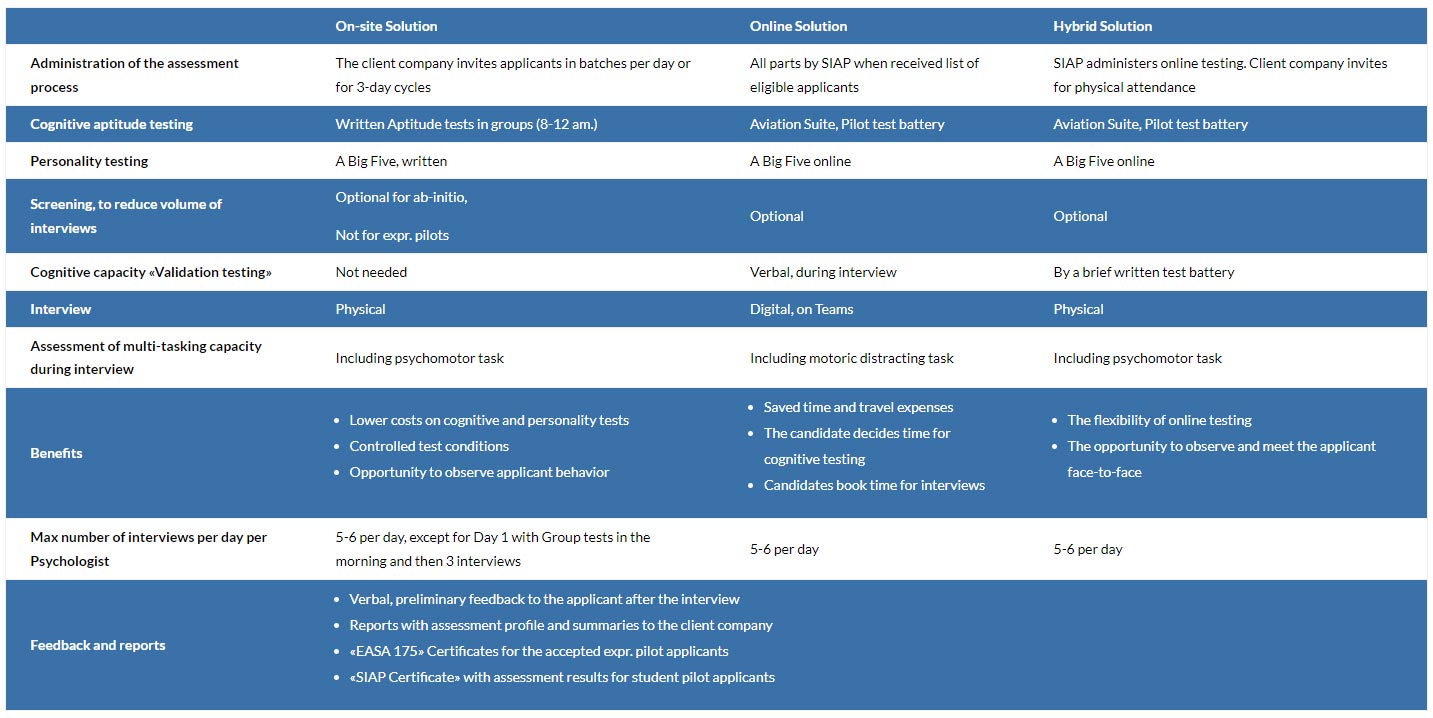Assessment solutions
Three solutions for cost-effective, high-quality assessments
The On-site solution
The main benefit is the opportunity to meet the candidate and to collect assessment data in standardized and controlled settings. Additionally, this solution is strictly scheduled and compact, making it very efficient and with lower costs per assessed applicant.
The recruiting company is advised to apply some kind of a pre-screening test or procedure in order to increase the pass-rate of the invited applicants. The on-site solution is often preferred when the applicants are local/regional and the costs for attending are at an acceptable level.
The Online Solution
The main benefit is a minimum of administration for the recruiting company which only provides a list of applicants and contact data, and receives assessment reports when the applicant has completed all parts of the assessment. The applicants do the tests at home and at a suitable time for them, and they also decide time for the interview by using our booking site.
The recruiting company then invites attractive candidates for their internal final assessments, simulator tests and or any procedure they want to apply.
The potential weakness of the digital solution is that the psychometric test conditions are uncontrolled. This poses a risk to the validity of the results. Unreliable results can be revealed by inconsistencies and mismatches in the profile, but can also be almost impossible to detect. A validity check is therefore integrated in the interview with the aviation psychologist, by a set of tasks given up front and no opportunity for use of unintended tools or assistance from others.
The Hybrid solution
| On-site Solution | Online Solution | Hybrid Solution | |
| Administration of the assessment process | The client company invites applicants in batches per day or for 3-day cycles | All parts by SIAP when received list of eligible applicants | SIAP administers online testing. Client company invites for physical attendance |
| Cognitive aptitude testing | Written Aptitude tests in groups (8-12 am.) | Aviation Suite, Pilot test battery | Aviation Suite, Pilot test battery |
| Personality testing | A Big Five, written | A Big Five online | A Big Five online |
| Screening, to reduce volume of interviews | Optional for ab-initio, Not for expr. pilots | Optional | Optional |
| Cognitive capacity «Validation testing» | Not needed | Verbal, during interview | By a brief written test battery |
| Interview | Physical | Digital, on Teams | Physical |
| Assessment of multi-tasking capacity during interview | Including psychomotor task | Including motoric distracting task | Including psychomotor task |
| Benefits |
|
|
|
| Max number of interviews per day per Psychologist | 5-6 per day, except for Day 1 with Group tests in the morning and then 3 interviews | 5-6 per day | 5-6 per day |
| Feedback and reports |
| ||
Screening between assessment phases
The cost-effectiveness can be increased by screening out applicants who at certain phases of the recruitment process clearly don’t meet minimum requirements. Such screening has to be managed with consideration and respect, and in most cases only when there is a certain time-span between the assessment process phases. The benefit of reducing the volume of applicants also has to match possible negative effects on the schedule of next phase; open slots in the interview schedule are not necessarily reducing costs.
Screening based on personality test profiles is not acceptable. The screening-out decisions have to be made either on cognitive aptitude test results, or after the complete psychological assessment and in order to reduce the number of applicants invited for company-internal assessments. Finally; the screening-out handling has to be made with respect for the applicant’s personal and professional integrity.
With on-site assessment solutions, screening can be done based on the aptitude testing and before the interview with the psychologist, but only in student applicant/cadet selection. To exclude experienced pilots attending in the midst of fellow colleagues is stigmatizing, disrespectful and unprofessional. To screen-out after the psychologist interview and before company interviews is possible, but depending on the schedule and practicalities, and it is still likely to be stigmatizing.
With online assessments, screening can be applied after the testing and before the psychologist interview, both in student and experienced pilot selection. This is a recommended practice to reduce costs, and there is little gained even for the applicant to spend time on an interview when the outcome is already clear. Based on the assessment reports from the psychologist the recruiting company is free to screen and invite only those applicants they want to process further.
With the hybrid solution, screening is always applied before invitation to participate physically.
Screening policy during the psychological assessments and applied criteria is always a part of the service agreement with the recruiting company.
Applied requirements
In assessment of experienced pilots, the requirements are based on general criteria for commercial
pilots, but adapted to the specific client company; their expectations, standards and flight operation.
For helicopter operators, there are significant differences between inland and offshore operations.
For fixed wing and airline operators, flying regional is also quite different from flying long haul. Some
applicants will manage any kind of pilot work, while others will thrive and succeed a lot better with a
certain kind of flight operation and work conditions. The applied requirements have to reflect the
specific pilot job and work conditions.
In cadet selection programs for companies, all the above applies.
In assessments of applicants to flying training schools, the requirements are based on general
standards used by commercial operators and the potential for meeting these after a successful
training. (See «Assessments for Flying Training Schools»)

What we are looking for
The success and growth of the aviation industry is made by ordinary people, motivated and able to enjoy contributing to flight safety. These ordinary people are generally sharing the characteristics that they:
- Have the needed cognitive capacities to learn and reason, without necessarily acing on all the applied aptitude tests
- Have normal well-functioning personalities; confident and stable enough both to judge and consider the situation and to take appropriate actions when needed
- Will enjoy the rhythm of adherence to procedures, get things done and to prioritize when there is more than one task in front of them
- Are able to control and enjoy the peace when everything goes the right way, yet also to boot up their skills and competences when something is odd and unusual
- Are able to communicate what they see and think, to contribute to a work climate flowing in trust, and to inspire their colleagues in making flight after flight successful
- Are motivated for operative work and technology, for teamwork and for being a part of an always dynamic, changing and developing industry
- Appreciate diversity and variations in all forms, except from keeping flight safety on top of the priority list
- Acknowledge that human errors will occur, strive to mitigate the consequences and to keep on sharing and learning until retirement
A development plan might be the answer
As two examples: A young applicant demonstrates potentials, but needs to stabilize efficient use of her/his capacities in some situations or generally to gain more personal and professional experience. Or, an experienced applicant is assessed as needing to develop ways of communication, teamworking or behavior in order to join in well to the company culture and ways of operation.
It is the privilege of the employing company to turn doubtful applicants down, and in times when applications are piling up that decision creates minor problems for the company apart from a lower pass-rate in their recruitment.
But most instructors and trainers are skilled in coaching, and the assessment report can be applied as a basis for a personal development plan. With a bit of extra resources, defined focus-areas in place and the ambition to assist in professional growth during a first period of employment, the pending applicant can develop into exactly the dedicated and loyal pilot the company is looking for.
This is not to compromise flight safety, and it requires a commitment to a learning company culture, but it means to appreciate that people are able to learn and develop. When including this option in the selection board considerations, the company increases the chances for meeting their recruitment goals and need of pilots.


